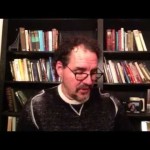We run our website the way we wished the whole internet worked: we provide high quality original content with no ads. We are funded solely by your direct support. Please consider supporting this project.
Molinism and Open Theism – Part I
I’ve been asked for the umpteenth time on Twitter lately about the difference between “Molinism” and “Open Theism,” and for some reason, today seemed like a good day to begin addressing this question. I’ll do this in two parts. Today I’ll outline and critique Molinism, and in a subsequent post I’ll raise yet another critique as a segue into discussing Open Theism (or better, the Open View of the Future, for as we’ll see, the issue is not about the nature of God or of his knowledge, but the nature of the future in the world he created).
I promise to try to keep these posts as free of philosophical jargon as possible!
What is Molinism?
Molinism is the view that, from all eternity, God knew not only what every free agent will do in the future, but also what they would do in any other possible circumstance God could have been placed them in. Out of his knowledge of what agents would do in every possible circumstance (called “Middle Knowledge,” for reasons we need not go into), God created the best possible world, placing every agent in the best possible circumstances that maximize the over-all good and minimize the over-all evil of his creation.
The most important distinctive aspect of Molinism, therefore, is that it holds that God chooses what each agent will do in the future on the basis of his Middle Knowledge of what each agent would do in every possible circumstance. Yet, Molinism holds that God doesn’t choose what agents would do in every possible circumstance, so it claims to avoid the determinism of Calvinism and to preserve the libertarian free will of agents (that is, the ability to choose otherwise).
The Grounding Objection
There are a number of cogent objections to Molinism, but in my two posts on this subject I’ll just mention the two that I deem most serious. In this post I’ll address “the grounding objection,” and in a subsequent post I’ll address a second objection as a way of segueing into the Open View.
Because it’s convenient to do so, philosophers typically talk about God’s knowledge in terms of his knowledge of the truth value of various propositions. So, if we accept that God knows the truth value of all propositions regarding what agents will and would do, we must wonder what it is that eternally grounds the truth value of propositions? (Hence the title, “the grounding objection”). A proposition is true if, and only if, it corresponds to some reality. So what is the eternal reality that corresponds to the truth value of these propositions?
To illustrate the problem, suppose God knows from eternity past that “Greg would eat a chocolate bar on the evening of May 16th, 2014.” What reality makes this eternally true? It can’t be God’s will that grounds this truth, for as Molinists acknowledge, this would mean God determined me to eat the chocolate bar, in which case I am not free. But neither can it be my willful decision on May 16th to eat this tasty treat that grounds this eternal knowledge, for my decision obviously didn’t exist an eternity ago.
The only alternative is to admit that the eternal truth of what agents will do and would do in all possible circumstances just is. These truths are caused by nothing and grounded in nothing, and this is essentially what most Molinists defend. There are at least three big problems with this view, however.
First, this view is tantamount to a type of eternal dualism, for it is positing an eternal reality alongside God that God himself didn’t create. Think about it. From all eternity, the truth of what every possible agent will do and would do in other circumstances is eternally settled — and God didn’t choose this! So we must accept that all the facts of what will come to pass and what would have come to pass in all other conceivable circumstance eternally existed alongside God as a reality he did not create.
Second, I contend that this dualism is incoherent. The concept of a body of eternally settled facts existing without cause is on the same level of the concept of an uncaused eternal unicorn floating in space. Since a unicorn is a contingent being, as is this alleged body of eternally settled facts, reason insists there must be a sufficient reason for it being the way it is and not otherwise. But alas, with regard to this alleged body of eternally settled facts, Molinism offers no such reason. It just is.
Third, not only is this concept incoherent, but I would argue that it leads to the very Calvinistic-type determinism it was designed to avoid. So far as I can see, it makes no difference whether my choices were settled by God an eternity before I make them or whether they are settled by nothing an eternity before I make them. Regardless of how my choices were eternally settled, the very fact that they are settled an eternity before I make them means that I am not the one who settles them. Yet, unless I am the one who resolves possible courses of action into actual courses of action – unless I am the one who settles what I choose — I cannot see how I am, in any significant (viz. libertarian) sense of the word, free.
So, while I deeply appreciate the desire of Molininists to preserve free will, I am afraid their system logically undermines it.
In the tomorrow’s post I’ll raise yet another serious objection to Molinism and use it as a launching pad to discuss the Open View of the Future and how it differs from Molinism.
Wonderlane via Compfight
Category: Q&A
Tags: Calvinism, Choice, Determinism, Free Will, God, Molinism, Open Theism
Topics: Open Theism What it is and is not, Providence, Predestination and Free Will
Related Reading

Why Doesn’t God Make Himself Obvious?
Why is faith so difficult? Why isn’t God more obvious? Why doesn’t God come out and provide irrefutable proof that he is God so that there is no more doubt? Greg’s father raised such questions and Greg’s responses are recorded in the book Letters from a Skeptic. _______________________ What would happen … if God individually…

So Much Evil. Why?
In light of the profound evil being experienced by the people of Paris and countless other locations around the world, we thought we would raise again the question that many ask when things like this occur: Why? Of course, Greg has spent much of his writing and speaking energy addressing this. Here is a basic,…

What is the significance of Exodus 32:14?
The Lord states his intention to destroy Israelites because of their wickedness: “Now let me alone,” he says to Moses, “so that my wrath may burn hot against them and I may consume them” (vs. 10). Moses “implored the Lord” (vs. 11) and, as a result, “the Lord changed his mind about the disaster that…

A Metaphysical Defense of Free Will
Warning: As the title of this post may have already suggested, this post is a bit heady – and a bit long. I’m going to get into some rather tall metaphysical grass as I go about defending free will. But for those who are interested in the free will debate and who are willing to…

What is the significance of Judges 2:20–3:5?
The Lord did not provide any assistance in Israel’s battles, “In order to test Israel, whether or not they would take care to walk in the way of the Lord as their ancestors did” (vs. 22). The pagan opponents of Israel “were for the testing of Israel, to know whether Israel would obey the commandments…

Free Will: What does Quantum Theory suggest?
Bet you didn’t think we’d be going here. Greg discusses how quantum theory supports the idea of free will.

